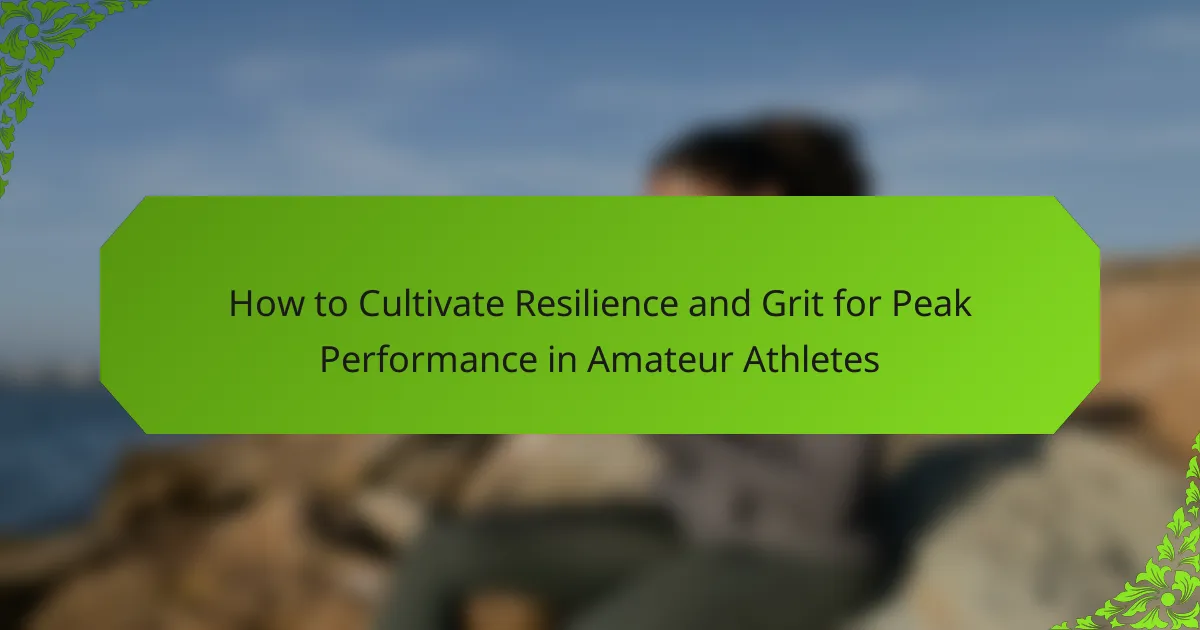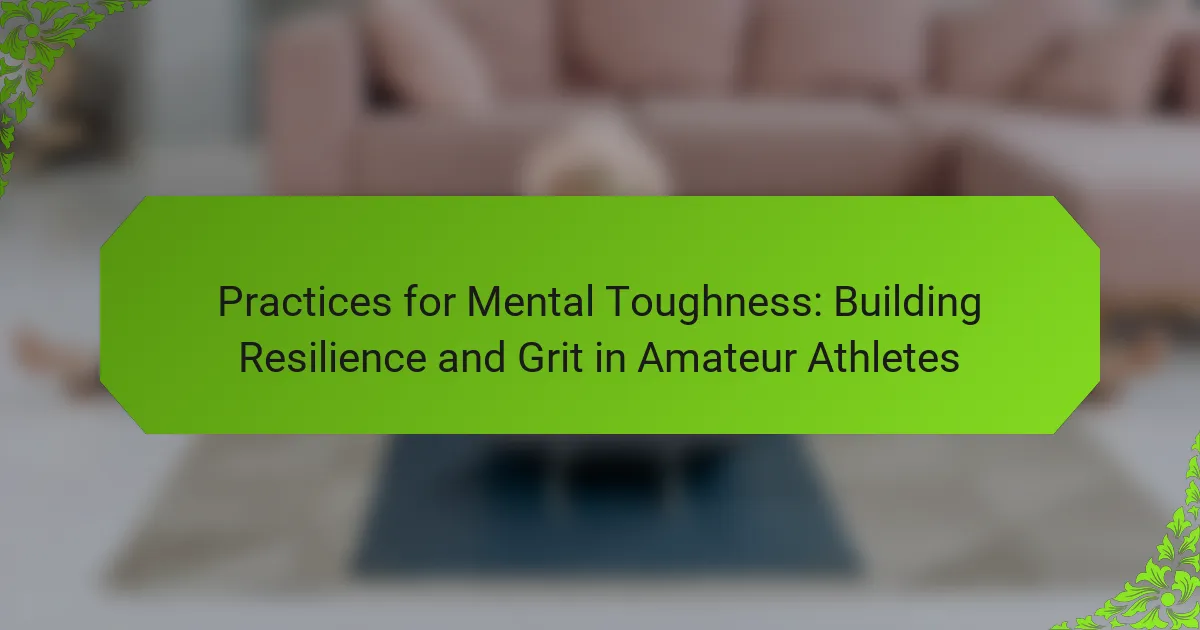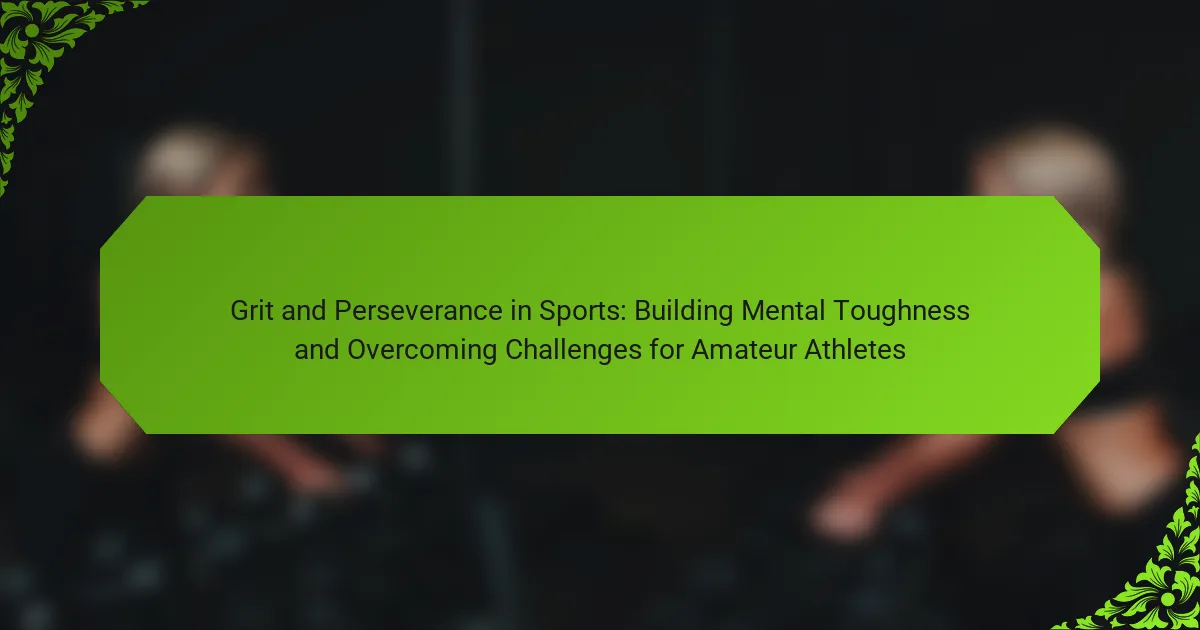Developing grit is crucial for amateur athletes aiming to enhance resilience and focus. Key strategies include setting clear goals, cultivating a growth mindset, and embracing challenges. Regular practice and seeking feedback foster accountability and improvement. Building a supportive community further strengthens determination and perseverance in the pursuit of athletic success.

What is Grit and Why is it Important for Amateur Athletes?
Grit is essential for amateur athletes as it fosters resilience and focus. Developing grit involves setting long-term goals, embracing challenges, maintaining a growth mindset, and practicing perseverance. These strategies enhance performance and encourage athletes to overcome obstacles. Research indicates that grit correlates with success in sports, emphasizing its importance in achieving athletic aspirations.
How Does Resilience Contribute to Athletic Performance?
Resilience significantly enhances athletic performance by fostering mental toughness and focus. Athletes with high resilience can better cope with stress, setbacks, and pressure during competitions. This adaptability leads to consistent performance improvements over time.
Developing grit involves engaging in challenging training environments, setting specific goals, and maintaining a positive mindset. Research shows that resilient athletes are more likely to persist through difficulties, ultimately achieving higher levels of success.
Furthermore, resilience can improve recovery from injuries. Athletes who cultivate resilience are often more proactive in their rehabilitation, leading to quicker returns to their sport. This unique attribute of resilience not only impacts performance but also enhances overall well-being in athletes.
What Are the Key Components of Grit?
Grit consists of passion, perseverance, and resilience. Passion fuels long-term commitment to goals, while perseverance enables sustained effort despite challenges. Resilience helps athletes recover from setbacks, fostering a growth mindset. Developing grit through consistent practice, goal-setting, and self-reflection enhances performance and mental toughness.

What Universal Strategies Can Help Build Grit?
Developing grit involves consistent strategies that enhance resilience and focus. Setting clear goals is essential, as they provide direction and motivation. Cultivating a growth mindset enables athletes to view challenges as opportunities for improvement. Regular practice and perseverance build habits that strengthen determination. Seeking feedback helps identify areas for growth and fosters accountability. Finally, surrounding oneself with supportive peers creates an environment conducive to persistence.
How Can Goal Setting Enhance Focus and Resilience?
Goal setting enhances focus and resilience by providing clear objectives and measurable milestones. Setting specific, achievable goals helps athletes concentrate their efforts and maintain motivation. Research indicates that goal-oriented individuals demonstrate higher levels of persistence and adaptability in challenging situations. This unique attribute of goal setting fosters grit, enabling amateur athletes to overcome setbacks and maintain their drive. Additionally, regularly reviewing and adjusting goals can reinforce commitment and enhance mental toughness, essential for long-term success in sports.
What Role Does Consistent Training Play in Developing Grit?
Consistent training is crucial for developing grit in amateur athletes, as it instills discipline and perseverance. Regular practice builds resilience by challenging athletes to push through discomfort and setbacks. This process enhances focus, enabling athletes to maintain their goals despite obstacles. Studies show that athletes who engage in structured training routines exhibit higher levels of determination and mental toughness. Ultimately, consistent training fosters a growth mindset, essential for long-term success in sports.
How Can Visualization Techniques Improve Performance?
Visualization techniques significantly enhance performance by improving focus and resilience. They enable athletes to mentally rehearse skills, boosting confidence and reducing anxiety. Techniques like imagery and mental practice create a clear mental blueprint, facilitating better execution during actual performance. Research indicates that athletes who incorporate visualization report higher levels of grit, enhancing their ability to persevere through challenges. By fostering a strong mental framework, visualization not only aids in skill acquisition but also strengthens the athlete’s resolve to achieve their goals.

What Unique Practices Foster Grit in Amateur Athletes?
Unique practices that foster grit in amateur athletes include setting specific goals, maintaining a growth mindset, and embracing challenges. These strategies cultivate resilience and focus, essential for long-term success.
Goal setting provides clear direction, allowing athletes to measure progress and stay motivated. A growth mindset encourages learning from failures, reinforcing the belief that effort leads to improvement. Embracing challenges helps athletes develop perseverance, as they learn to push through difficulties and setbacks.
Incorporating these practices creates a supportive environment that nurtures grit, ultimately enhancing performance and personal growth in amateur athletes.
How Can Mindfulness Techniques Be Applied in Training?
Mindfulness techniques can enhance training by improving focus and resilience. Incorporating practices like meditation and breathing exercises can help athletes manage stress and maintain concentration during workouts. Regular mindfulness sessions can lead to better emotional regulation, allowing athletes to push through challenges. Additionally, visualization techniques can enhance performance by mentally preparing athletes for competition. Consistent application of these techniques fosters a growth mindset, essential for developing grit.
What Is the Impact of Positive Self-Talk on Grit Development?
Positive self-talk significantly enhances grit development by fostering resilience and focus in amateur athletes. This mental strategy encourages a growth mindset, allowing athletes to persevere through challenges. Research shows that positive self-talk can improve performance and increase motivation, leading to greater persistence. By reinforcing belief in their abilities, athletes cultivate a unique attribute of grit: the capacity to maintain effort despite setbacks. As a result, integrating positive self-talk into training routines can yield substantial benefits in athletic performance and personal development.
How Can Athlete Mentorship Programs Enhance Grit?
Athlete mentorship programs significantly enhance grit by providing guidance, support, and accountability. These programs foster resilience through structured feedback and shared experiences, helping athletes navigate challenges. Mentors instill a growth mindset, encouraging athletes to embrace setbacks as learning opportunities. Additionally, mentorship cultivates focus by setting clear goals and promoting consistent practice. The unique attribute of personalized mentorship allows for tailored strategies that align with individual athlete needs, ultimately strengthening their mental toughness and perseverance.
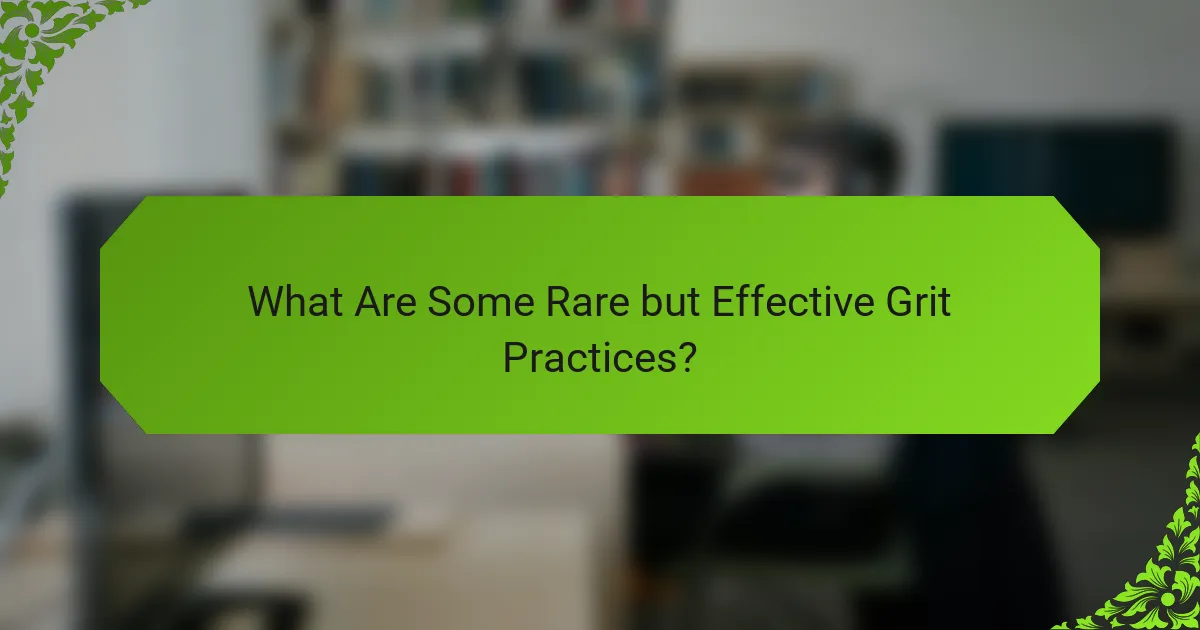
What Are Some Rare but Effective Grit Practices?
To develop grit, amateur athletes can adopt rare but effective practices like visualization, embracing discomfort, and fostering a growth mindset. Visualization enhances performance by mentally rehearsing skills and scenarios. Embracing discomfort builds resilience through challenging experiences. A growth mindset encourages viewing setbacks as learning opportunities, ultimately strengthening determination.
How Can Competitive Experiences Shape Resilience?
Competitive experiences can significantly enhance resilience by teaching athletes to overcome adversity. Engaging in challenging situations fosters mental toughness and grit, essential for long-term success. Research indicates that athletes who face competition develop adaptive coping strategies, which improve their ability to handle stress and setbacks. This process not only builds confidence but also reinforces a growth mindset, enabling athletes to view challenges as opportunities for improvement. Ultimately, these experiences contribute to a stronger, more resilient athlete capable of thriving under pressure.
What Unique Challenges Do Amateur Athletes Face in Building Grit?
Amateur athletes face unique challenges in building grit, including limited resources, inconsistent training environments, and balancing commitments. These factors can hinder resilience and focus, making it essential to develop tailored strategies. For example, establishing a consistent routine can enhance discipline, while setting realistic goals fosters motivation. Additionally, seeking support from mentors or peers can provide encouragement and accountability, crucial for overcoming obstacles. Building grit requires recognizing these challenges and actively addressing them through targeted approaches.
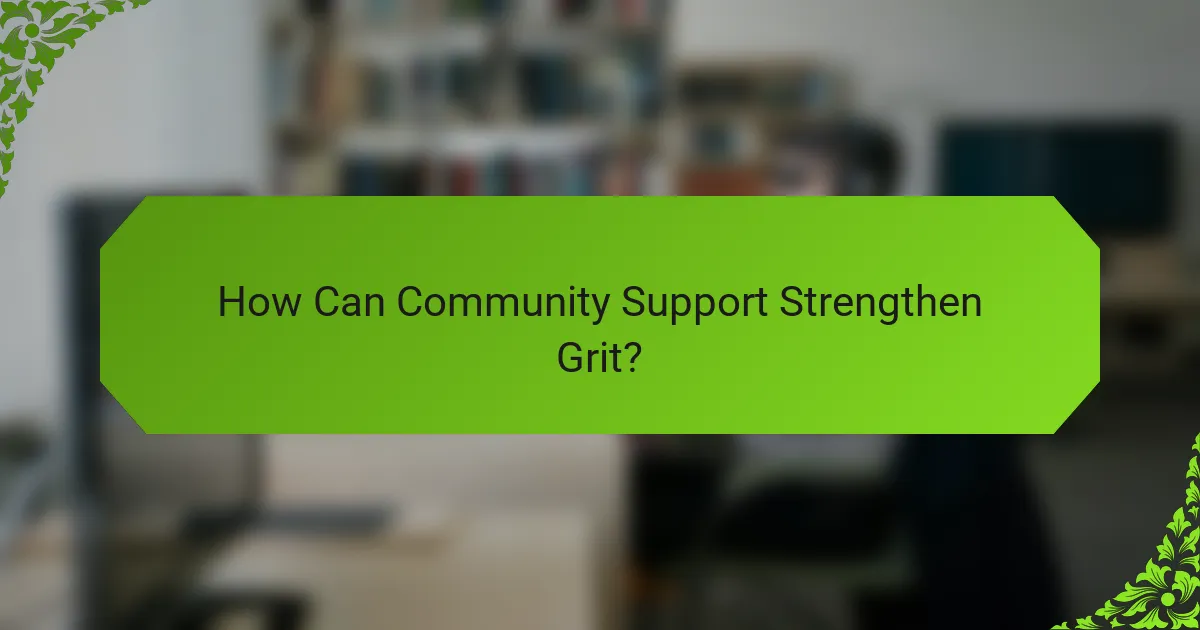
How Can Community Support Strengthen Grit?
Community support enhances grit by providing motivation, accountability, and shared experiences. Engaging with a supportive network fosters resilience through encouragement during challenges. Studies show that athletes with strong community ties demonstrate higher levels of perseverance and focus. This social reinforcement is crucial for maintaining commitment to long-term goals.
What Role Do Team Dynamics Play in Fostering Resilience?
Team dynamics significantly enhance resilience by fostering collaboration and support among athletes. Strong relationships within a team create a safe environment where individuals can share challenges and strategies. This interconnectedness cultivates a collective grit that empowers members to overcome setbacks. For example, teams that engage in regular communication and feedback demonstrate higher resilience levels, as members feel valued and understood. Additionally, diverse skill sets within a team can provide unique perspectives, driving innovative problem-solving during difficult times.
How Can Local Sports Events Promote Grit Development?
Local sports events foster grit development by providing athletes with real-world challenges that enhance resilience and focus. Participants face competitive pressure, learn to manage setbacks, and cultivate perseverance through practice and teamwork. These experiences are crucial for building mental toughness, which is a unique attribute of grit. Moreover, community support during local events can motivate athletes to push beyond their limits, reinforcing a growth mindset essential for long-term success. Engaging in such environments helps amateur athletes develop the grit necessary for overcoming obstacles in sports and life.

What Are the Common Mistakes Amateur Athletes Make in Developing Grit?
Amateur athletes often overlook essential strategies in developing grit, leading to common mistakes. One mistake is setting unrealistic goals, which can result in frustration and burnout. Another is neglecting mental training, focusing solely on physical aspects. Additionally, athletes may fail to embrace failure as a learning opportunity, hindering their resilience. Finally, a lack of consistency in practice can undermine grit development, as persistence is key to building resilience.
What Are the Best Practices for Avoiding Burnout?
To avoid burnout, amateur athletes should prioritize self-care, set realistic goals, and maintain a balanced routine. Implementing regular breaks and practicing mindfulness can enhance resilience. Establishing a support network fosters motivation and accountability. Tracking progress helps in recognizing achievements and adjusting strategies.
How Can Athletes Balance Grit with Mental Health?
Athletes can balance grit with mental health by prioritizing self-care, seeking support, and practicing mindfulness. Developing resilience requires understanding limits and recognizing when to rest. Regular mental health check-ins enhance focus and performance. Establishing a support network fosters accountability and emotional well-being.

What Actionable Tips Can Help Amateur Athletes Build Resilience and Focus?
To build resilience and focus, amateur athletes should implement specific strategies. Start by setting clear, achievable goals to maintain motivation. Incorporate regular reflection to assess progress and identify areas for improvement. Practice mindfulness techniques to enhance concentration during training and competition. Additionally, embrace a growth mindset by viewing challenges as opportunities for learning. Finally, establish a supportive network to foster encouragement and accountability.
How Can Daily Routines Enhance Grit?
Daily routines significantly enhance grit by fostering discipline and consistency. Regularly engaging in structured activities cultivates resilience, which is essential for amateur athletes. For instance, setting specific training schedules helps athletes develop a strong work ethic. Additionally, incorporating goal-setting practices within daily routines can improve focus and motivation. Research indicates that athletes who maintain consistent routines are more likely to persevere through challenges, ultimately strengthening their mental toughness.
What Strategies Can Be Implemented Immediately for Improvement?
To improve immediately, amateur athletes can implement strategies focusing on mental resilience and discipline. Start by setting specific, achievable goals to maintain motivation. Incorporate daily routines that include physical training, mental conditioning, and reflection. Engage in visualization techniques to enhance focus and prepare for challenges. Lastly, cultivate a supportive environment by surrounding yourself with encouraging peers and mentors.
